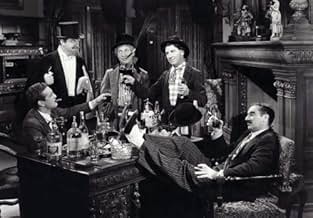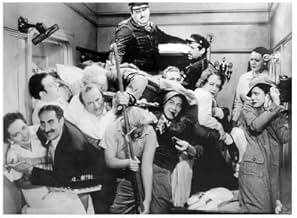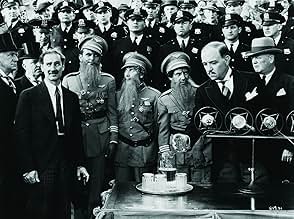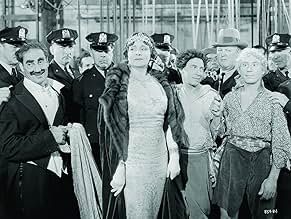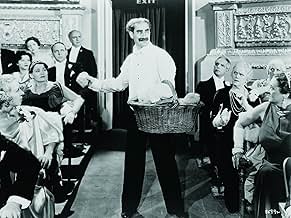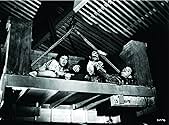ÉVALUATION IMDb
7,8/10
35 k
MA NOTE
Un directeur sournois et les deux amis loufoques de deux chanteurs d'opéra aident ceux-ci à obtenir la gloire tout en humiliant leurs ennemis guindés et snobs.Un directeur sournois et les deux amis loufoques de deux chanteurs d'opéra aident ceux-ci à obtenir la gloire tout en humiliant leurs ennemis guindés et snobs.Un directeur sournois et les deux amis loufoques de deux chanteurs d'opéra aident ceux-ci à obtenir la gloire tout en humiliant leurs ennemis guindés et snobs.
- Prix
- 2 victoires au total
Walter Woolf King
- Rudolfo Lassparri
- (as Walter King)
Sig Ruman
- Herman Gottlieb
- (as Siegfried Rumann)
Robert Emmett O'Connor
- Police Sergeant Henderson
- (as Robert Emmet O'Connor)
Enrique Acosta
- Nightclub Guest
- (uncredited)
Harry Adams
- Opera Spectator
- (uncredited)
Harry Allen
- Doorman
- (uncredited)
Sam Appel
- Dungeon Guard
- (uncredited)
King Baggot
- Dignitary
- (uncredited)
Marion Bell
- Lady looking for 'Aunt Minnie'
- (uncredited)
Edna Bennett
- Maid
- (uncredited)
Histoire
Le saviez-vous
- AnecdotesIn exasperation after several attempts to have Groucho Marx read one of his lines in the manner director Sam Wood had requested, Wood exclaimed, "I guess you just can't make an actor out of clay." Groucho Marx instantly responded, "Nor a director out of Wood."
- GaffesRicardo is clearly standing on the dock as the ship pulls away, yet he turns up on board later as a stowaway.
- Citations
Otis B. Driftwood: It's all right, that's in every contract. That's what they call a sanity clause.
[Fiorello laughs loudly]
Fiorello: You can't fool me! There ain't no Sanity Claus!
- Autres versionsAll references to the first portion of the film taking place in Italy were edited from the original negative sometime after the original release. There is speculation that this was done during WWII when Italy was as Axis power, but it also may have been done in the late 1930's to appease Mussolini, who didn't like the way Italians were being portrayed. Either way, the film's first scene begins rather abruptly and is missing a musical number and references to Milan, Italy.
- ConnexionsEdited into Apaga y vámonos: Episode #1.5 (2013)
- Bandes originalesIl Trovatore: Di quella pira
(1853) (uncredited)
Music by Giuseppe Verdi
Libretto by Leone Emanuele Bardare and Salvatore Cammarano
Sung by Walter Woolf King
with The MGM Symphony Orchestra
Commentaire en vedette
Groucho Marx is in his element as slick, fast talking business manager Otis B. Driftwood, who spends his time playing up to arts patron Mrs. Claypool (classic Marx Bros. foil Margaret Dumont). When he sees that she's willing to pony up $1,000 a night to have pompous Lassparri (Walter Woolf King) sing, he wants a piece of the action. Circumstance soon throws him together with equally sly Fiorello (Chico) and goofy Tomasso (Harpo), as they become determined to help out young lovers & aspiring opera stars Rosa (Kitty Carlisle) and Ricardo (Allan Jones).
Even if one is not a fan of the opera, they shouldn't let that dissuade them from checking out the Marx Bros. in their glory. Some buffs consider this their best film, and it certainly shows off their talents to memorable effect. Musical interludes do go on a bit long, but the quality of the comedy when it occurs is top notch. There are some truly great bits in here, like the "party of the first part" contract, the overcrowded (to say the least) stateroom sequence, and the frantic, farcical efforts of Otis, Fiorello, Tomasso, and Ricardo to pull the wool over the eyes of a suspicious inspector (Robert Emmett O'Connor) by moving beds from one room to another.
Groucho is hilarious, as always. Very few entertainers in film history can fire off a one-liner as snappily as he does. Chico and Harpo have their wonderful moments, as well. (It's such a hoot when Harpo does a Spider-Man routine near the end.) Carlisle and Jones are extremely appealing, Dumont is once again a fine "straight woman", King is an appropriately snooty villain, Sig Ruman is superb as eternally frustrated Gottlieb, and O'Connor is likewise good as the antics of Otis and company take a toll on him.
The pace isn't always consistent, but there is some enjoyable action and first rate stunt work. Overall, this is a solid comedy / musical that will appeal to any lover of this era in cinema.
Eight out of 10.
Even if one is not a fan of the opera, they shouldn't let that dissuade them from checking out the Marx Bros. in their glory. Some buffs consider this their best film, and it certainly shows off their talents to memorable effect. Musical interludes do go on a bit long, but the quality of the comedy when it occurs is top notch. There are some truly great bits in here, like the "party of the first part" contract, the overcrowded (to say the least) stateroom sequence, and the frantic, farcical efforts of Otis, Fiorello, Tomasso, and Ricardo to pull the wool over the eyes of a suspicious inspector (Robert Emmett O'Connor) by moving beds from one room to another.
Groucho is hilarious, as always. Very few entertainers in film history can fire off a one-liner as snappily as he does. Chico and Harpo have their wonderful moments, as well. (It's such a hoot when Harpo does a Spider-Man routine near the end.) Carlisle and Jones are extremely appealing, Dumont is once again a fine "straight woman", King is an appropriately snooty villain, Sig Ruman is superb as eternally frustrated Gottlieb, and O'Connor is likewise good as the antics of Otis and company take a toll on him.
The pace isn't always consistent, but there is some enjoyable action and first rate stunt work. Overall, this is a solid comedy / musical that will appeal to any lover of this era in cinema.
Eight out of 10.
- Hey_Sweden
- 4 déc. 2016
- Lien permanent
Meilleurs choix
Connectez-vous pour évaluer et surveiller les recommandations personnalisées
Détails
Box-office
- Brut – à l'échelle mondiale
- 5 320 $ US
- Durée1 heure 36 minutes
- Couleur
- Rapport de forme
- 1.37 : 1
Contribuer à cette page
Suggérer une modification ou ajouter du contenu manquant

Lacune principale
By what name was A Night at the Opera (1935) officially released in India in English?
Répondre


